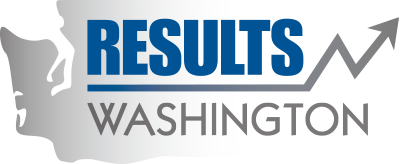Introduction and purpose
Results Washington is directed to provide innovative, data-driven performance management across the state as stated in Executive Order 13-04. Our agency is responsible for deciding reporting requirements for performance measures to help ensure we are aligning policy, budget, and performance objectives to make fact-based decisions that create a legacy of performance and accountability for the future.
This guide was created to support Washington state agencies in moving toward a comprehensive statewide performance management system that provides meaningful information for decision-making at all levels of state government. Staff in the governor’s office who oversee budget, policy, performance, and equity need access to accurate and timely information on how the state is progressing on its strategic priorities as well as how the state is performing in its core programs and services. State agencies also need a cohesive reporting system to save time and duplication of effort.
If we want to strengthen public confidence and trust in the government, keeping our focus on results that benefit Washingtonians is critical. The people of Washington depend on easy-to-access, prompt services that are free from discrimination or historical systems designed to benefit a few. They need to trust that our limited resources are going towards programs that maximize their results. Additionally, state agency staff depend on leadership to ensure their hard work is having an impact.
This guide, and the accompanying resources linked throughout, should enable state agencies to measure and report data that supports decision-making with a focus on breaking down barriers to access and ensuring everyone benefits from services and programs. Our ultimate goal is improving statewide performance measure requirements and criteria that not only comply with state law, but are also useful to agencies, all parts of the governor’s office and the Legislature.
We will continue to work on improving our current statewide performance management system so that eventually, all the information necessary to make informed, data-driven decisions is in one place while building a cohesive platform that agencies use to relay their progress on how their services and programs are performing to continue receiving the support and funding from decision makers.
Terminology used in the guide
The way we talk about performance measures varies between organizations and has changed over time. Because so much of performance measurement is about building shared understanding about the problems we are trying to solve, a critical first step is ensuring we are talking about the same things with the terms we use.
This guide seeks to use plain language as much as possible, and we encourage agencies to do the same. Performance management isn’t just the job of specialized staff; every single person in an organization has responsibility for the system and benefits from it working right, so the terms we use must be understandable for everyone.
Many of the concepts are like ones used in previous guides for the state, but we are intentionally using new language to support our shift in focus as we make performance management in Washington more inclusive, collaborative, equity-focused, and actionable.
See Appendix 1: Terminology for a list of common terms used throughout this guide and their context for this guide’s purposes.
Requirements and criteria
After reading this guide, our goal is that agencies have helpful information to begin creating new measures or updating existing measures to ensure the following requirements and criteria are met:
- Establish quality measures for each major activity in your budget
- Develop a diverse set of measures that represents your agency’s core programs and services, budget-related activities, legal requirements, and strategic planning
- Identify specific measures required by enterprise-facing agencies and how they align with your other statewide measures
- Create measures that:
- Provide an overview of your work and its challenges
- Answer questions to guide future work
- Are specific, relevant, actionable, understandable, timely, reliable, cost-effective, inclusive, equitable, accessible, and sustainable
- Include information at all levels of the agency (front-line staff, management, and executive leadership)


 previous
previous